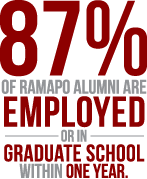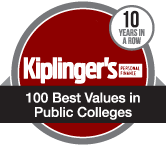College Catalog: 2012-2013
School of Theoretical and Applied Science (TAS): Mathematics (B.S.)
Website: School of Theoretical and Applied Science
Convener:
Faculty:
Mathematics continues to be a vibrant and growing discipline. At Ramapo College students can find a mathematics program that is challenging, up-to-date, and tailored to meet their career needs. Students are offered the choice between a traditional major and one concentrating on teacher education. A blend of pure and applied mathematics courses is offered to provide students with a firm and diverse foundation. This gives the student the opportunity to pursue graduate study, to teach at the secondary or elementary school level, or to seek employment in industry or government.
Students are expected and encouraged to become familiar with emerging technologies. Mathematics is no longer simply a traditional subject of instruction, it is also an important tool in developing these new technologies. Mathematics majors at Ramapo College take a semester of computer science, and continue to develop their technological skills in higher level mathematics courses. This incorporation of computers and graphing calculators helps students develop the skills necessary to meet the challenges of the technology age.
Mathematics education is facing new and important challenges. The need for mathematics teachers is currently strong and expected to grow. The mathematics program at Ramapo College prepares students for careers in education, through the teacher education concentration within the mathematics major. This program is tailored to provide the background and insights needed for a career in secondary education. In addition to the standard calculus-analysis sequence, students receive instruction in algebra, geometry, number theory, probability, statistics, and the history of mathematics. Mathematics majors intending to pursue a career in elementary education will also benefit from the diversity of courses offered in the teacher education concentration, through those courses students receive instruction in the practices and methods of teaching. In their senior year, they spend a semester student teaching in area schools.
A knowledge of mathematics offers students a diversity of job opportunities. Someone who has completed a major in mathematics has developed a strong set of quantitative and analytical skills. A person possessing such skills, along with experience in computer science, is well-qualified to pursue a career in such areas as actuarial science (primarily in the insurance industry), quantitative analysis (a growing field in the financial industry), market research, scientific programming, biomedical statistics, cryptography (one of the nation’s largest employers of mathematicians is the National Security Agency) and diverse other fields.
Students in mathematics can also continue their education in graduate or professional school. Someone who has pursued a graduate degree will have, in addition to the opportunities mentioned above, the possibility of a career in research (many such positions exist in both industry and government) or in teaching at the college or university level.
The faculty in the mathematics program at Ramapo College consists of highly qualified, dedicated, experienced, and caring instructors. The knowledge of this faculty encompasses a wide spectrum of the mathematical cosmos. Whether a student has an interest in mathematical analysis, abstract algebra, probability and statistics, topology, Fourier analysis, or graph theory, there will be a faculty member to share that interest. The ever-increasing importance that the computer plays in our world is recognized by the mathematics faculty. This faculty has the knowledge to assist and instruct students in mathematics, computer science, and the interaction between the two fields.
The mathematics major is offered by the School of Theoretical and Applied Science and leads to a B.S. degree.
The mathematics minor is an excellent complement to a wide range of majors.
- Transfer students who have 48 or more credits accepted at the time of transfer are waived from the courses marked with a (W) below. Waivers only apply to General Education Requirements NOT School Core or Major Requirements.
- Double counting between General Education, School Core, and Major may be possible. Check with your advisor to see if any apply.
- Writing Intensive Requirement: Three writing intensive courses in the general education curriculum are required: First Year Seminar, Critical Reading and Writing (formerly College English), and READINGS IN THE HUMANITIES.
- Subject & Course # – Title & Course Description
- GENERAL EDUCATION REQUIREMENTS
- INTD 101 - FIRST YEAR SEMINAR (W)
- SELECT ONE – (W) BADM 115 OR BADM 115 - PERSPECTIVES OF BUSINESS AND SOCIETY OR
- (W) SOSC 101 - SOCIAL ISSUES
- CRWT 102 - CRITICAL READING & WRITING II (was ENGL 180)
- AIID 201 - READINGS IN HUMANITIES (W)
- SELECT ONE – (W) GE-HISTORY CATEGORY: HIST 101-110
- SELECT ONE – GE-INTERCULTURAL NORTH AMERICA CATEGORY
- SELECT ONE – GE-INTERNATIONAL ISSUES CATEGORY
- SELECT ONE – (W) GE-TOPICS ARTS AND HUMANITIES CATEGORY OR
- (W) GE-TOPICS SOCIAL SCIENCE CATEGORY
- SCHOOL OF THEORETICAL AND APPLIED SCIENCE REQUIREMENT
- SATISFIED WITH MATH 121 AND MATH 441 BELOW
- MATHEMATICS MAJOR REQUIREMENTS
- Traditional Track
- CMPS 147 - COMPUTER SCIENCE I
- MATH 121 - CALCULUS I
- MATH 122 - CALCULUS II
- MATH 225 - MULTIVARIABLE CALCULUS
- MATH 237 - DISCRETE STRUCTURES OR MATH 205 - MATHEMATICAL STRUCTURES
- MATH 262 - LINEAR ALGEBRA
- MATH 305 - DIFFERENTIAL EQUATIONS
- MATH 416 - INTRODUCTION TO ANALYSIS
- MATH 432 - ABSTRACT ALGEBRA
- MATH 441 - HISTORY OF MATH (capstone course)
- PHYS 114 - PHYSICS I WITH CALCULUS: LECTURE AND LAB
- Select Four Electives (numbered above 237, two at the 300/400 level):
- MATH 245 - NUMERICAL ANALYSIS
- MATH 253 - PROBABILITY
- MATH 282 - NUMBER THEORY
- MATH 290 - TOPICS:
- MATH 321 - GEOMETRY
- MATH 353 - STATISTICS
- MATH 360 - STOCHASTIC CALCULUS FOR FINANCE
- MATH 390 - ADVANCED TOPICS
- MATH 490 - TOPICS:
- Teacher Education Track
- CMPS 147 - COMPUTER SCIENCE I
- MATH 121 - CALCULUS I
- MATH 122 - CALCULUS II
- MATH 225 - MULTIVARIABLE CALCULUS
- MATH 237 - DISCRETE STRUCTURES OR MATH 205 - MATHEMATICAL STRUCTURES
- MATH 253 - PROBABILITY
- MATH 262 - LINEAR ALGEBRA
- MATH 282 - NUMBER THEORY
- MATH 321 - GEOMETRY
- MATH 353 - STATISTICS
- MATH 416 - INTRODUCTION TO ANALYSIS
- MATH 432 - ABSTRACT ALGEBRA
- MATH 441 - HISTORY OF MATH (capstone course)
- PHYS 114 - PHYSICS I WITH CALCULUS: LECTURE AND LAB
- Teacher Education Track electives:
- One elective (numbered above 237) from below:
- MATH 245 - NUMERICAL ANALYSIS
- MATH 290 - TOPICS:
- MATH 305 - DIFFERENTIAL EQUATIONS
- MATH 360 - STOCHASTIC CALCULUS FOR FINANCE
- MATH 390 - ADVANCED TOPICS
- MATH 490 - TOPICS:
Note: A 2.0 GPA in the major is required for graduation.
- At least 1/2 of the courses fulfilling a minor must be distinct from the student’s major. That is, three of the five courses required for a minor cannot be used towards fulfillment of major requirements. A school core does not need to be completed for a minor. Minors are open to students regardless of school affiliation.
- Subject & Course # – Title & Course Description
- Required Courses:
- MATH 121 - CALCULUS I
- MATH 122 - CALCULUS II
- MATH 237 - DISCRETE STRUCTURES OR
- MATH 205 - MATHEMATICAL STRUCTURES
- MATH 262 - LINEAR ALGEBRA
- SELECT ONE – Mathematics Elective (numbered above 237)
- MATH 245 - NUMERICAL ANALYSIS
- MATH 253 - PROBABILITY
- MATH 282 - NUMBER THEORY
- MATH 290 - TOPICS:
- MATH 305 - DIFFERENTIAL EQUATIONS
- MATH 321 - GEOMETRY
- MATH 353 - STATISTICS
- MATH 360 - STOCHASTIC CALCULUS FOR FINANCE
- MATH 390 - ADVANCED TOPICS
- MATH 416 - INTRODUCTION TO ANALYSIS
- MATH 432 - ABSTRACT ALGEBRA
- MATH 441 - HISTORY OF MATH (capstone course)
- MATH 490 - TOPICS:
General Education Requirements
Four Year Plan
Graduation Requirements
School of Theoretical and Applied Science Website
Faculty Profiles






